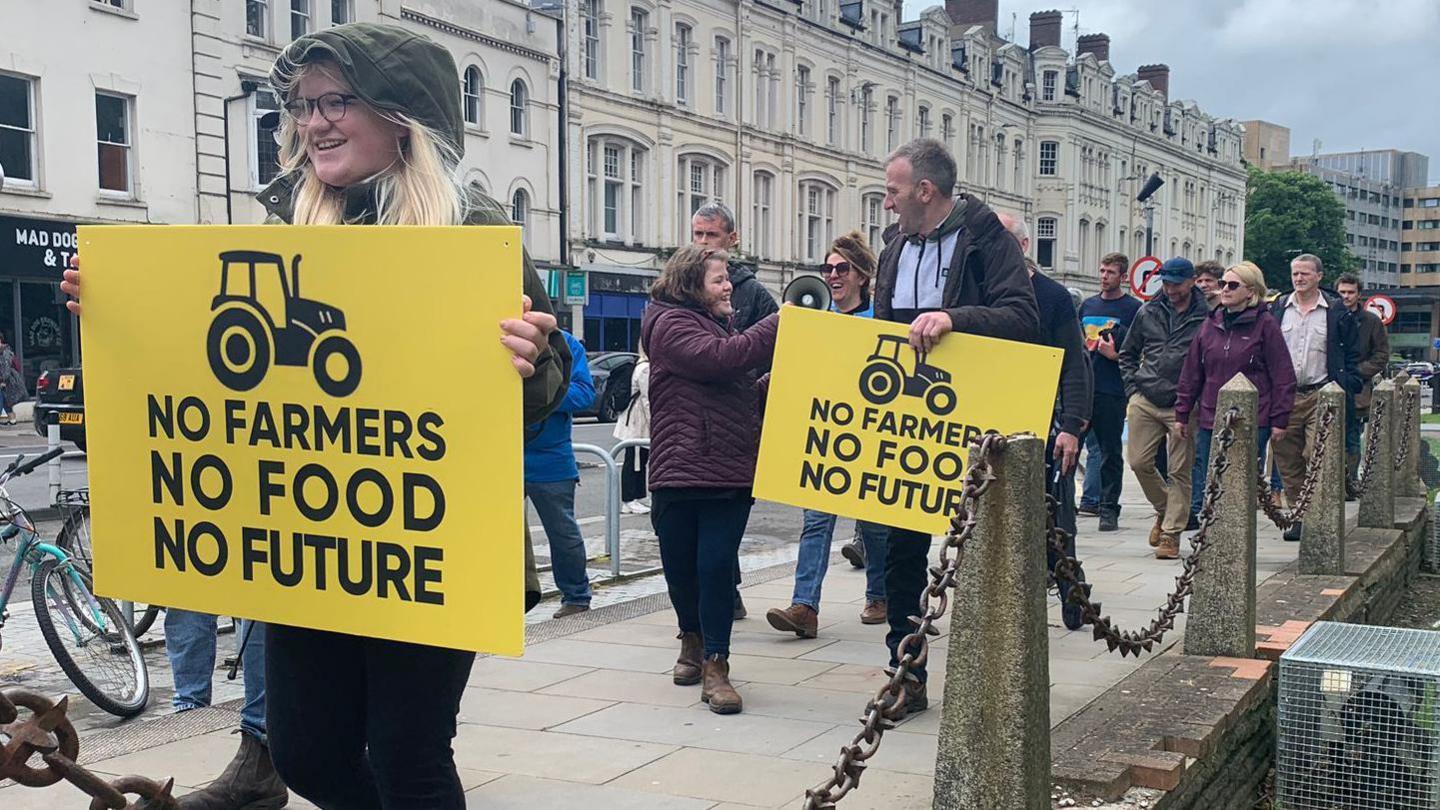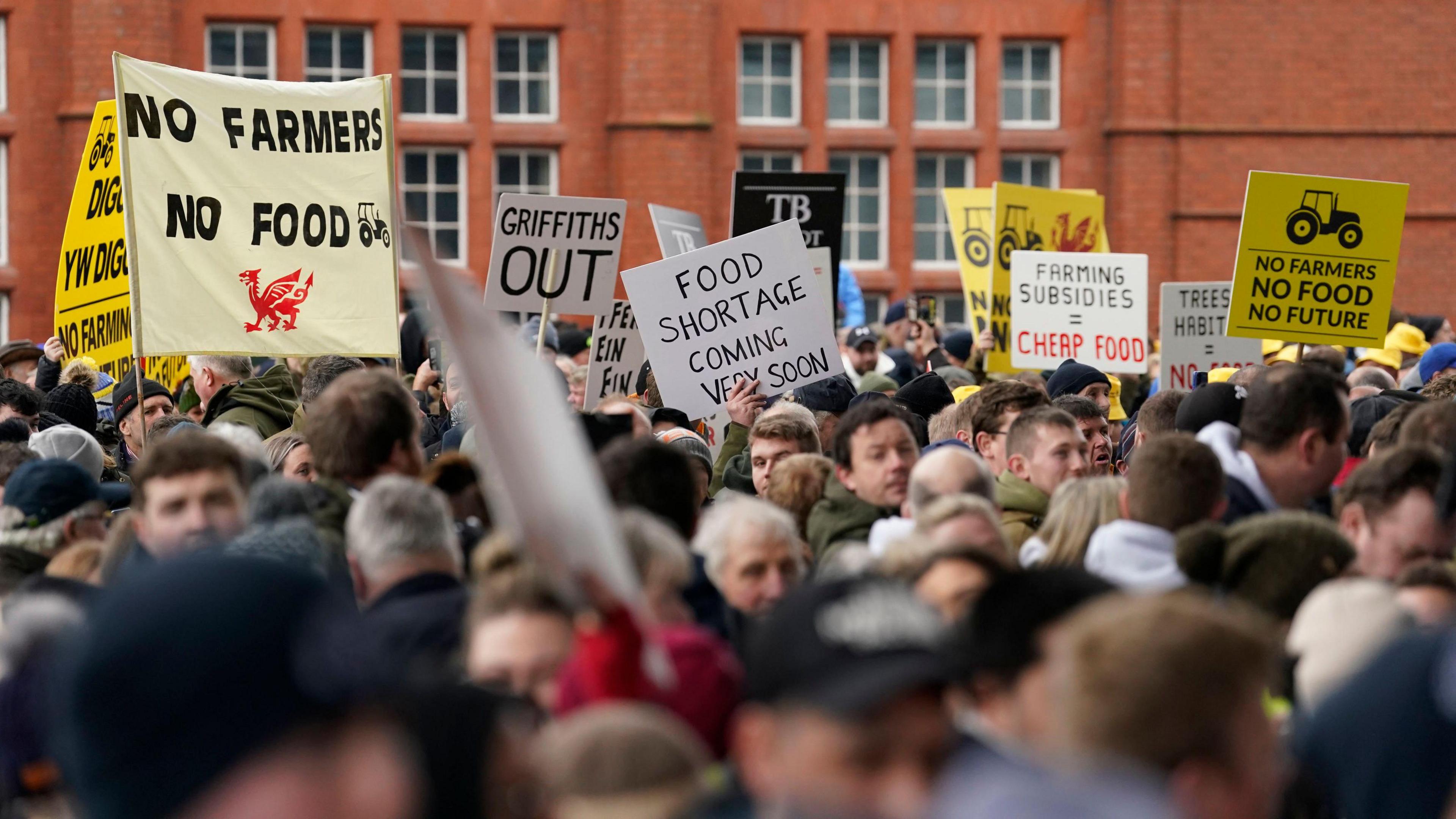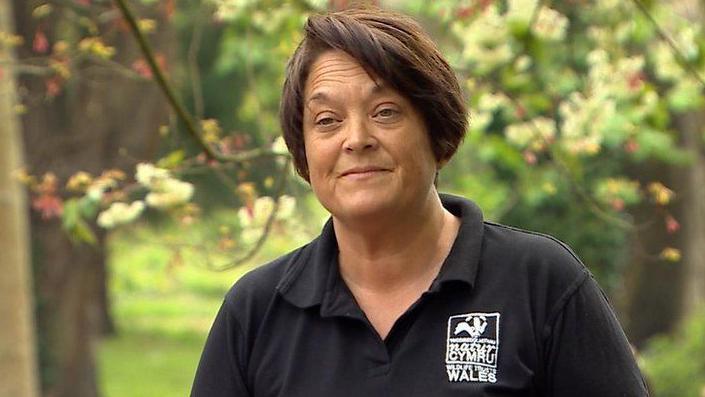Protest-hit farm subsidy plan pushed back a year

About 30 people attended a protest in Cardiff on Tuesday, the day the delay in the scheme was announced
- Published
A major overhaul of farming subsidies in Wales is to be delayed by another year until 2026, following widespread protests.
Rural Affairs Secretary Huw Irranca-Davies said the decision showed the Welsh government was "listening" to farmers' concerns.
A farmers' union welcomed the delay, but one nature group says it "prolongs the uncertainty".
The Welsh government said a new timeframe would give them the opportunity to "work through a number of important aspects".
Thousands of protesting farmers descend on Cardiff
- Published28 February 2024
Why are farmers in Wales ready to protest?
- Published28 February 2024
Drakeford blames Brexit vote over farm funding row
- Published20 February 2024
Farmers will continue to receive their current main subsidy - paid based on how much land they farm - in 2025.
Plans for a different approach to agricultural funding have been in development since Brexit, with the goal of rewarding more environmentally-friendly ways of farming.
A third and - supposedly final - consultation on the Sustainable Farming Scheme (SFS) earlier this year led to protests across Wales and 12,000 responses.
Farmers called a 10% tree cover rule for farms "unworkable", claiming it could cost the industry 5,000 jobs.
More than 3,000 farmers and their supporters staged the largest ever Senedd protest in February calling for the scheme to be scrapped, along with changes to TB control measures and regulations to reduce nitrates from seeping into rivers.

About 3,000 farmers and their supporters protested outside the Senedd in February
Speaking at a press conference held on a farm near Bridgend, Mr Irranca-Davies said the government had "always said the scheme would not be introduced until it is ready and I stand by that".
The SFS was meant to start coming in from April 2025, with reforms to farm subsidies having already been pushed back several times.
Mr Irranca-Davies said his commitment to "meaningful engagement" with the farming sector and others on "the changes needed will necessitate a change in the implementation timetable".
Neath hill farmer Liam Price, who organised a small protest in Cardiff on Tuesday, said he is still worried about what will happen in a year's time.

Aberdare hill farmer Chloe Hyde says she wants the government to "work with us"
“[Huw Irranca-Davies] still hasn’t said what changes he’s making," he said. "It may be a year down the line, but we’ve still got to fight."
Aberdare hill farmer Chloe Hyde agreed, adding the TB policy in Wales is also causing problems.
“I’m not against [SFS]," she said. "There are a few things in there that will be beneficial for everyone.
“As long as they work with us and we can plant trees on ground that isn’t productive, we’ll be more than happy, but I know that isn’t the same for everyone."
Wildlife Trusts Wales called the delay "bad news for farmers, nature and climate".
“[It] prolongs the uncertainty at a time when farmers need to be rewarded for switching to sustainable farming methods," said trust director Rachel Sharp.

Wildlife Trusts Wales director Rachel Sharp called the delay "bad news for farmers, nature and climate"
"Delaying measures to help farms adapt to our changing climate now only increases costs tomorrow," she said.
"It’s clear that the current food system isn’t working for farmers, nature, climate and even consumers."
The Nature Friendly Farming Network called the delay "disappointing".
"The Welsh government must maintain its ambition to support and reward nature-friendly farming," said the network manager Rhys Evans.
Conservatives said it was "positive" the minister has listened to concerns from farmers.
"What we need to see is real change to SFS in its current form," said Tory rural affairs spokesperson James Evans.
Plaid Cymru called the delay "an opportunity to take a step back and make the necessary changes".
NFU Cymru applauded the rural affairs secretary for taking a "sensible and pragmatic approach".
What is the Sustainable Farming Scheme?
The Sustainable Farming Scheme (SFS) is the Welsh government’s big plan for funding the farming industry after Brexit, which puts a lot more emphasis on the environment.
Under the proposals, farmers would be paid for actions resulting in environmental, animal welfare and social outcomes - over and above minimum legal requirements.
In order to gain access to the scheme, farmers would have to commit to having trees on 10% of their land, and earmark 10% as wildlife habitat.
The scheme has sparked widespread protests in recent months.
Arguing that this is not practical while keeping a farm business going, many farmers are concerned that the requirements of the scheme will overwhelm them with paperwork.
On the other hand, the Welsh government is under pressure from environmentalists to ensure that the plan is ambitious.
As 80% of Wales' landscape is under the care of farmers, the argument is that they have a key role in tackling climate change.